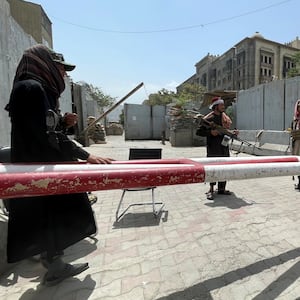Now that the Taliban are back in control, a series of reported internet outages in Afghanistan is fueling fears among Afghan residents that the group is already using their newfound power to isolate protesters, quash dissent, and exert their influence across the country.
In Panjshir—where resistance leader Ahmad Massoud and Afghanistan’s former vice president are working to resist the Taliban’s resurgence—the Taliban have already forced a communications and internet blackout, according to data from Access Now, a digital rights organization.
“According to our data… the Taliban has cut off the internet, along with phone connections and all other forms of communication, in the province of Panjshir,” Felicia Anthonio, a campaigner for Access Now, which has been monitoring internet connectivity in Afghanistan, told The Daily Beast. “We believe this is in order to curtail resistance in this area, the only area that is still holding out against their takeover.”
Multiple Afghan residents with strong ties in Panjshir also confirmed shutdowns in the province to The Daily Beast. A BBC reporter was the first to report Taliban-induced outages in the provinces.
Cutting off communications from the holdout is likely aimed at shielding the world from seeing the humanitarian crisis currently unfolding in Panjshir, where families are without enough food, basic supplies, and medical supplies, according to sources on the ground.
“I will say Taliban is trying to cut the links for the people who are connected or linked with the other countries,” one Afghan interpreter said. “If the Taliban cut off the internet, what would be the fate of our lives?”
A female reporter in Afghanistan told The Daily Beast she wasn’t surprised by the group’s latest tactics. “There is nothing unlikely from a group like the Taliban,” she said. “They [the Taliban] cut off the telecommunications companies in Panjshir. There is no way to communicate… They will do this to silence our voice so that it does not reach the world… what they are currently doing in Panjshir.”
Although data on internet outages in Afghanistan can be imprecise at times, frequent drops in connectivity across the country have been observed in recent days, according to data collected by the Cooperative Association for Internet Data Analysis (CAIDA). Interruptions were detected particularly in Hirat, Kabul, and Parwan between Sept. 9 and Sept. 11. Neither CAIDA nor The Daily Beast has been able to independently confirm the Taliban’s role in causing those outages—but the signs are worrying.
This wouldn’t be the first time the Taliban has resorted to controlling internet access to cement its power. In 2001, the group banned the internet for fear it was spreading obscene images. And since then, the Taliban have been coercing and threatening telecommunications operators to force outages as it sees fit. Now, threats to the internet are making an already tumultuous situation in the country more grim.
“The internet shutdown aggravates the humanitarian crisis that the Taliban are initiating in the valley, where entire families are trapped without enough food, basic supplies, or any form of communication with the outside world,” Anthonio said of Panjshir.
As protests against Taliban rule swell around the country, sources on the ground tell The Daily Beast the Taliban are already moving to suppress dissent and demonstrations through internet outages or disruptions designed to target the most resistant regions.
“They took control in Panjshir to stop the people from connecting to each other and also to stop any protest against them,” an Afghan who requested anonymity to protect their safety told The Daily Beast last week. “There is a 20 year anniversary today and they cut the internet so people can’t connect to figure out about protests [in Kabul].”
Protesters want to get the word out about the demonstrations on social media, so the Taliban are naturally stepping in to curtail communications, an Afghan man, who requested anonymity for fear for his safety, told The Daily Beast. “When people protest they beat them, and others make videos of that,” the man said. “They don't want the world to know that they are still the same people [they were 20 years ago] since they need financial support from the world.”
For all the Taliban’s talk of moderation following their takeover in Afghanistan, their control of the internet—and how and whether they decide to block certain Afghans from online communications—could reveal their true hand moving forward. This kind of effort to control Afghans’ access to the internet, even regionally, is to be expected, especially as protests crop up across the country, although the Taliban might not fess up to it, Anthonio explained.
“It is likely that the Taliban will avoid explicitly saying that they wish the internet suspended or restricted, but it will take many steps to make clear that it has regulatory and de facto power over telecom providers and networks running in the country,” said Anthonio. “As resistance continues or deepens in pockets of the country—including peaceful protests by Afghans—it is possible that the Taliban will order targeted internet shutdowns in particular townshops, provinces, or other strategic spaces, as well as placing surveillance and web censorship pressure on telecom firms continuing to operate in the country.”
Dictatorial regimes have long resorted to forcing internet shutdowns to control populations, especially in the face of anti-government protests. The Egyptian government plunged 23 million users into an internet blackout in Egypt in 2011 during anti-government demonstrations calling for Egyptian President Hosni Mubarak to step down. In 2019, Iran cut off its citizens’ internet access for days in the face of protests.
The Taliban, in particular, are no strangers to coercing telecommunications companies to participate in and propagate temporary outages so they can control certain populations and stem the flow of information. For years, the group has been sending notices to operators in certain regions, warning them to stop service, or else face violence: The Taliban shut off mobile telephone networks in Helmand province in 2011, claiming that foreign spies could use mobile phones to track their movements.
In 2017, the Taliban destroyed several telecom towers in Ghazni province and ordered mobile phone companies to shut off service between 6 p.m. and 6 a.m., as a kind of overnight curfew, in an attempt to block Afghan forces from communicating and running intelligence operations, according to VOA. A year later, the group shut down 120 mobile towers to interrupt Afghan military and intelligence agencies’ communications, affecting connectivity in Helmand, Uruzgan, and Zabul provinces.
And if mobile network operators don’t comply, companies have historically faced violent repercussions, from exploding bombs and rockets at cellular towers to kidnappings and killings, according to a publication about U.S. work on Afghanistan’s information and communications technology sector from the U.S. Department of Defense’s Defense Information Systems Agency. The Taliban have also burnt down or blown up towers over the years, burning fuel tanks and generators along the way.
Of course, when the group was last in power, the internet infrastructure that exists today was not nearly as robust, and the Taliban might be reluctant to blow up their access to telecommunications since they need them to communicate now as well, according to Anthonio. “The Taliban itself is a more active user of the internet now as compared to the 2000s, with many of the group’s senior figures and spokespeople active there along with communication channels for its supporters,” she said.
Even so, although the Taliban have been trying to paint themselves as more moderate and reformed, that doesn’t mean they’ll avoid causing blackouts, even regionally or temporarily, says Doug Madory, the director of internet analysis at Kentik, a network traffic visibility company. “At the end of the day… if you’ve got a ruler who feels embattled or fears they’ll be pushed out [and] they fear they’ll lose everything, then the consequences don’t matter,” Madory told The Daily Beast. “It doesn’t matter what the international community says. Everything’s on the table.”
In recent years, dictatorial leaders have shifted from total blackouts to more temporary and geographically targeted outages in order to avoid sending their economies into a nosedive, says Madory, who has been monitoring internet outages around the globe since the Arab Spring.
“For a while the trend was to be more surgical in the blocking because there’s a lot of collateral damage when you shut the country completely off,” Madory said. “In the Egypt-style shutdown they just pulled the plug for everything and that’s a pretty catastrophic move, it’s kind of a nuclear option of shutdowns. It’s usually not sustainable—modern society requires internet connection now and you can’t do that for very long.”
More modern shutdowns Madory has been tracking have been increasingly reliant on shutting down mobile internet service—so that anti-government protesters are blocked from communicating—but leaving up fixed line services so government offices, people working in office buildings, and wealthy people with connections in their homes can stay online while protesters are left in the dark, says Madory.
Kentik has not seen much activity regarding outages in Afghanistan in recent days, but Madory told The Daily Beast his team’s visibility into the country is not necessarily precise enough to reveal meaningful updates about on-the-ground realities.
Moving forward, the Taliban will likely use internet outages to bend the will of the Afghan people, while maintaining some connectivity for their own purposes, says Douglas London, the CIA’s former counterterrorism chief for South and Southwest Asia. “The Taliban need control and they prosper when there’s less connectivity to the outside world,” London told The Daily Beast. “They’ll try to use it for their own means… monitor dissent, identify threats to them.”
Just how far the Taliban are willing and able to go with forced internet outages remains to be seen. Historically, the major telecommunications companies in Afghanistan have struggled to balance their desire to keep the internet on for Afghans with the pressures of Taliban insurgents threatening violence against staff if they don’t comply, a former U.S. official who worked with the telecommunications firms to build up the industry in Afghanistan told The Daily Beast.
“In general there was resistance against it… everybody wanted internet… [The companies] had a willingness to keep this on and help out their fellow Afghans rather than designing to the Taliban’s threats,” the former U.S. official said. “But… if [they threaten to] kidnap a whole bunch of your staff: It’s like do I turn off the tower or do I lose these people who are friends and family?”
The major telecommunications companies in the country did not return requests for comment.
A military officer operating in the CENTCOM region suggested the Taliban could continue affecting service through coercion and threats of violence toward the companies, as they have many times before.“Through the threat of violence you could likely make it very unattractive to not comply with what they’re asking,” the officer told The Daily Beast.
“All of these companies are used to dealing with loss,” the former U.S. official who helped build up the telecommunications industry in Afghanistan told The Daily Beast. “I think they’ll continue to kind of resist to a large degree—but everybody has their breaking points.”









